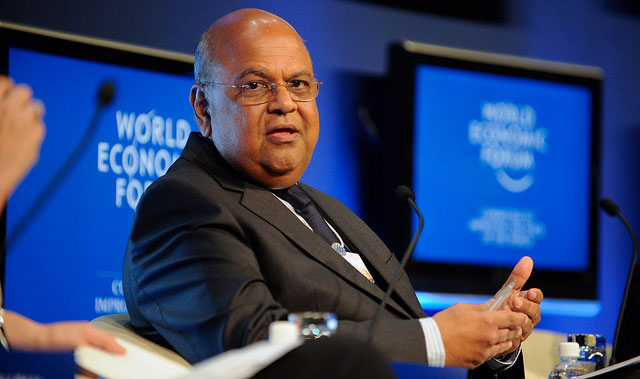
The showdown between President Jacob Zuma and finance minister Pravin Gordhan over control of the nation’s finances appears to be reaching its endgame, after prosecutors summoned the minister to appear in court next month on fraud charges.
While Zuma, 74, reaffirmed his support for Gordhan on Tuesday, opposition parties and analysts have speculated that the president intends using the case as a pretext to appoint a more pliant head of the national treasury and the finance chief’s firing is imminent.
“The universal verdict of every serious commentator is that the National Prosecuting Authority has basically found some flimsy pretext to go after the finance minister,” Daryl Glaser, a politics professor at the University of Witwatersrand in Johannesburg, said by phone on Wednesday.
Zuma can either fire or “retain him in a weakened state in the hope that he can intimidate Pravin Gordhan into not resisting some of the things that Zuma wants”, Glaser said.
Gordhan, 67, has been the key driver of South Africa’s efforts to maintain its investment-grade credit rating and shore up an economy that’s growing at the slowest pace since a 2009 recession. The treasury’s pledge to keep spending under control and limit debt was cited as crucial for S&P Global Ratings and Fitch Ratings to avoid a cut to junk.
The rand, which fell by the most in more than three months to the dollar on Tuesday after the NPA announced details of the charges against Gordhan, extended declines on Wednesday, slumping as much as 0,9% to its lowest level since 2 September. It later briefly gained as much as 2,5% after chief prosecutor Shaun Abrahams told lawmakers he was willing to consider any submission from Gordhan to reconsider the decision to institute charges. It weakened 0,4% to R14,29 at 7.46am in Johannesburg on Thursday.
After months of investigations, prosecutors on Tuesday summoned Gordhan to appear in court on 2 November on charges of fraud over his approval of the early retirement and subsequent reappointment on a contract basis of a former colleague. That resulted in “fruitless” expenditure of R1,1m, they said. They’re also probing allegations that Gordhan oversaw the establishment of an illicit investigation unit when he was commissioner of the South African Revenue Service.
The announcement that Gordhan will be charged followed disagreements with Zuma over the management of state-owned enterprises and the national tax agency.
Political stitch-up
What Gordhan calls a political stitch-up is dividing even senior members of the ruling ANC. There was already unease over the party’s worst electoral performance since the end of apartheid when in a municipal vote in August it lost control of three major cities, including the capital, Pretoria, and Johannesburg, the economic hub.
“Many of us are not convinced about the nature of the charges and are concerned by the questions that minister Gordhan himself has posed about the purpose and actually what drives this campaign,” Joel Netshitenzhe, a member of the ANC’s decision-making national executive committee, said by phone. “We seem to be scoring own goals and seem to be impervious to the dire consequences of some of the actions we take.”

Jackson Mthembu, the ANC’s chief whip in parliament, said they will accompany Gordhan to court on 2 November.
The ANC’s Women’s League, a close Zuma ally, said it accepted assurances by Abrahams that the decision to prosecute Gordhan wasn’t political, and that those who alleged political interference were hellbent on undermining the Zuma administration’s efforts to transform the economy.
Zuma said in a statement that Gordhan is innocent until proven guilty and that the summons came at “the most sensitive time for the country when Minister Gordhan was successfully leading initiatives towards economic revival”.
Pressure from ruling party and business leaders prompted Zuma to appoint Gordhan as finance minister in December after his decision to give the post to little-known lawmaker Des van Rooyen sparked a sell-off in the rand and nation’s bonds.
The latest move against the finance minister has angered the ANC’s labour and communist party allies.
It’s clear the charges against Gordhan are being driven by those intent on looting state funds, said Solly Mapaila, the second deputy general secretary of the South African Communist Party.
“This is appalling,” Mapaila said by phone. Gordhan “has been at the centre of the fight against looting and he has to be removed by hook or crook. The charge is quite frivolous. The NPA has no integrity”.
Zuma faces legal problems of his own.
This week Thuli Madonsela, the nation’s graft ombudsman, is due to release interim findings into whether members of the Gupta family, who are friends of the president, influenced the appointment of cabinet ministers and the awarding of state contracts and licences. Zuma has sought to delay the release of her report, saying he needs to be able to question witnesses and present evidence.
The Democratic Alliance, the main opposition party, is also waging a court battle to force prosecutors to reinstate 783 graft charges against Zuma that were dropped just weeks before he became president in May 2009. Zuma appealed against a 29 April high court finding that the decision to drop the case was wrong, and the supreme court of appeal agreed Wednesday to hear oral argument before it decides whether to consider the case.
Junk rating
The political wrangling and uncertainty may weigh on South Africa’s credit rating, which is up for review by S&P in December. The ratings company and Fitch both kept their assessments at one level above junk in June, while warning the government to take decisive steps to end the turmoil and bolster growth.
“Gordhan is being politically lynched,” said Nicholas Spiro, a partner at London-based Lauressa Advisory, which advises asset managers. “The whole thing beggars belief and gives the agencies ample reasons to strip South Africa of its investment-grade status.” — (c) 2016 Bloomberg LP




